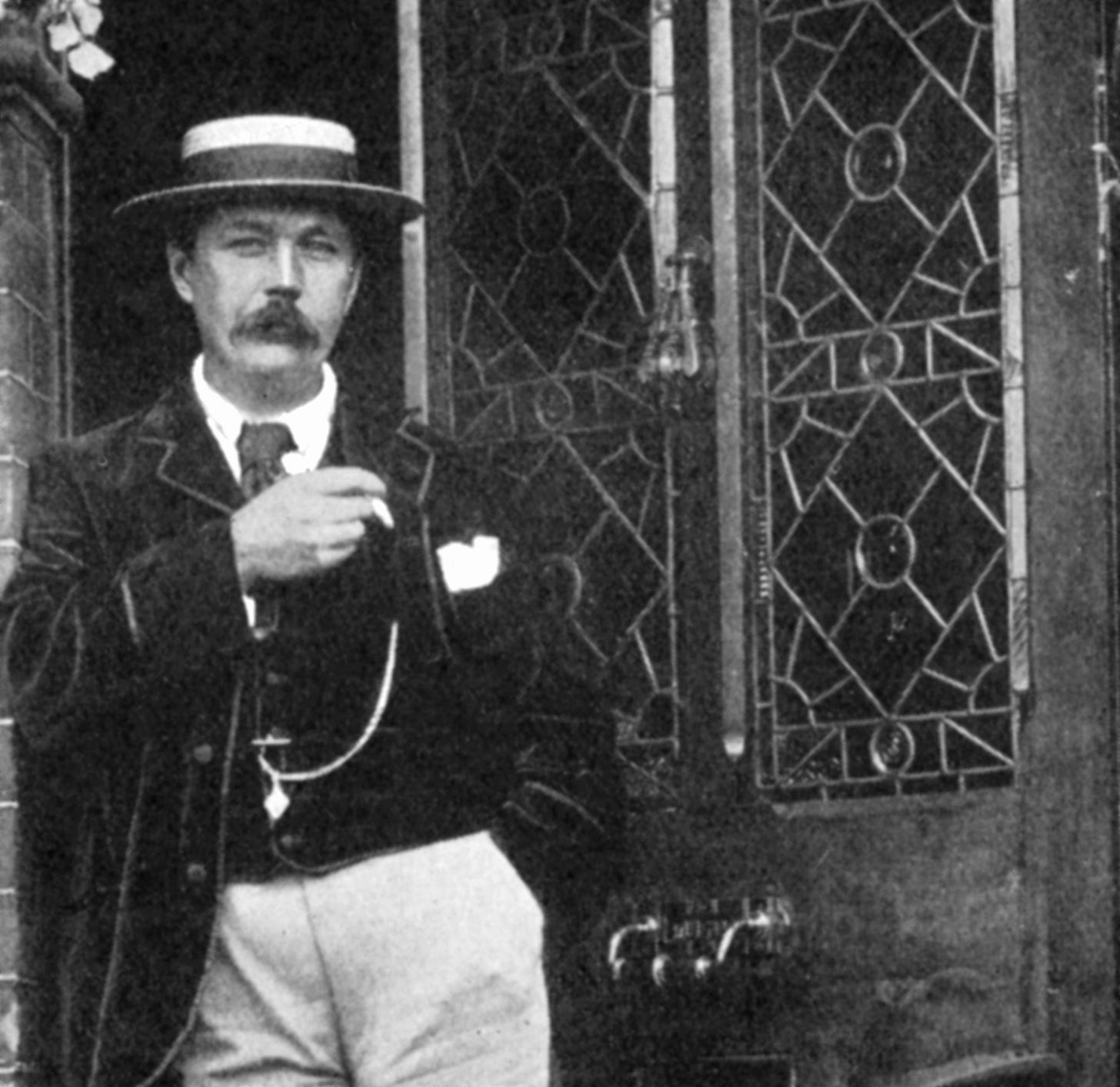The Other Side of Sir Arthur Conan Doyle
A Holmesian Quest for Life After Death.
Listen to this article:
In the depth of your hopes and desires lies your silent knowledge of the beyond; and like seeds dreaming beneath the snow, your heart dreams of spring. Trust the dreams, for in them is hidden the gate to eternity.
—Kahlil Gibran
All You Need is Love
—The Beatles
Sir Arthur Conan Doyle, the creator of one of the most fiercely logical fictional characters, one who solved crimes with an almost superhuman deductive and inductive prowess, utilized his own honed reasoning powers to solve what he considered to be the most important question faced by humanity; do we continue after death? To Conan Doyle, this was his greatest task. To solve, through rigorous reasoning, this highly intractable mystery.
The most compelling stories he would ever write came after the Sherlock Holmes corpus, stories that told of the nature of life after death. Most people, including myself, who only considered Conan Doyle as the brilliant creator of Holmes, would never have suspected him to write on such a controversial and unusual topic, a topic that on the face of it is the irrational counterpoint to the intense rationality of Holmes.
Slaying Holmes
In 1891 Conan Doyle had written to his mother, “I think of slaying Holmes…and winding him up for good and all. He takes my mind from better things.” And so he did. In his story The Final Problem, Conan Doyle introduced the criminal mastermind Moriarty who, we come to find out, ends up in a mortal struggle with Holmes resulting in both falling to their deaths at the Reichenbach Falls in Switzerland.
He traded in Holmes, killed him off on a mountaintop, and after writing a few more stories to quell the public outcry that occurred after the death of Holmes, dedicated the last decade of his life to pursuing the nature of the afterlife. Ultimately he proved to himself the validity of continuation of personality after death and described detailed accounts of his findings in his later work.
Conan Doyle himself began as a skeptic concerning the continuation of life after death, considering the notion that individual personalities could survive death to be delusional. He was under the Materialist conviction that the personality was dependent on the physical body and when the body and brain are dead so goes the personal life of that person. He called the idea of an afterlife “The greatest nonsense on earth.” It wasn’t until he was inundated with evidence from people he respected, began to do his own thorough investigating of mediumship, married a medium, and had his own first-hand experiences, that he was able to escape the grasp of his skepticism.
In his book The New Revelation, he writes:
I was amazed to find what a number of great men—men whose names were to the fore in science—thoroughly believed that spirit was independent of matter and could survive it. When I regarded Spiritualism (aka mediumship) as a vulgar delusion of the uneducated, I could afford to look down upon it; but when it was endorsed by men like Crookes, whom I knew to be the most rising British chemist, by Wallace, who was the rival of Darwin, and by Flammarion, the best known of astronomers, I could not afford to dismiss it. It was all very well to throw down the books of these men which contained their mature conclusions and careful investigations, and to say ‘Well, he has one weak spot in his brain,’ but a man has to be very self-satisfied if the day does not come when he wonders if the weak spot is not in his own brain.
My Own Holmesian Quest
One day the question hit me too. And I went on my own Holmesian quest of discovery. Somehow I found myself investigating questions concerning life after death like it was the most important research I could do. Within a fulfilling career as a neuroscientist, the compulsion found me and wouldn’t let go. As a skeptic myself I had the same concerns as Conan Doyle and began to wonder about the possible weak spot in my brain. But just as when a mystery confronts Holmes there was no turning back, I also had an obsessive streak that wouldn’t allow me to quit the quest once I got started.
Mediumship is nothing that I would have thought myself encountering. But encounter it I did. It happened by chance. I was listening to one of my favorite interview shows, Buddha at the Gas Pump, hosted by Rick Archer. It’s a show about spirituality and spiritual awakening, with a very diverse group of interviewees. One day a self-professed medium was on the show and I listened to the interview, enraptured. This woman, Suzanne Giesmann, did not fall under my stereotypical vision of people who claim to talk to dead people. I had a view of mediums that was pretty negative, like that of Whoopi Goldberg’s character, Oda Mae Brown, in the movie Ghost; fraudulent show people who prey on the gullibility of the grieving. People with questionable scruples.
But this medium was no Oda Mae. Suzanne is a retired U.S. Navy Commander. She served as a commanding officer, as special assistant to the Chief of Naval Operations, and as Aide to the Chairman of the Joint Chiefs of Staff on 9/11. She was awarded the Defense Distinguished Service Medal, has a Master’s Degree in National Security Affairs, and taught political science at the U.S. Naval Academy. She was always extremely logical, describing herself as a completely left-brained military mind, and had no belief in anything like mediumship until her step-daughter was killed by a stroke of lighting on duty in Afghanistan.
Two days before hearing of her death, Suzanne had an extremely vivid dream where her stepdaughter, who was six months pregnant, told Suzanne that she and her baby were fine and very happy. While the dream was beautiful and positive, she still felt something was off and had a sense something horrible had happened. And then they got the news. That incident sent her on a journey to discover more. She now works as an “evidential” medium. Someone whose top priority is to obtain messages from loved ones who have passed that are so specific and exact that the information cannot be denied.
The world that opened up to me after first listening to that interview almost ten years ago has been no less than miraculous, leading me to participate in and critically observe mediumship workshops, to having my own budding mediumship skills allow me to obtain messages from my closest friend and colleague who passed away four years ago, to currently being engaged to an amazing medium whose talents I have eye-witness access to daily.
Checking Your Messages
One of the first “messages” I received from my friend was a continual looping in my head of the song “All You Need Is Love” by the Beatles. A song that I hadn’t listened to for years. At the time I was in a long-term committed relationship and didn’t feel unloved, but the words kept flowing and something in me sensed the importance of them. As the months went on I began to understand why I was being given that message and I considered ending my 25-year-long relationship.
This was extremely difficult and I didn’t think it possible that I could leave the life that I had built so carefully. Then new messages started coming. I kept encountering the same themes over and over: themes having to do with trapped birds, gilded cages, and spreading wings. But I needed more. So I asked my dear dead friend as I was driving by myself to a cabin about an hour away, to give me a clear sign that I should leave my relationship. I asked him if that’s definitely what he was trying to tell me, to play the song “Free Bird” on the radio as I was driving to the cabin. I knew if I heard this song I could feel assured of the path I needed to take.
I hadn’t remembered ever hearing that song on the radio stations I listen to in my car, so the likelihood of it playing by chance during that one-hour drive was nearly zero. I was almost at the end of the journey and it didn’t come on. I was starting to feel like I may have been wrong or asked for too much, but as I turned onto the last mile of the one-lane country road that led to the cabin, Free Bird started playing. As you might imagine, the feeling was indescribable.
And he wasn’t done. Just for good measure, just in case the weak spot in my brain was still getting in the way, the next week when I drove back to the cabin, and on that very same last mile, Free Bird played again. So, I listened to my friend. And I flew. The changes that have ensued since those early days have left me in awe of the spiritual world around me. As it turned out, my friend was right. All I needed was love. The new relationship I’m in now has revealed the places within myself where I was unloved but didn’t even know existed.
Somehow I was compelled, or you may say, guided, to follow in the footsteps of Sir Arthur and discover that the continuation of life after death, that most awesome of mysteries, can be solved. We might call it intuition that prompted my journey as it probably did for him. And that makes sense too when you think of Sherlock Holmes. For as gifted a deductive mind as his, there was always that spark of intuition that held the ultimate clues for him. As he told Watson, “Intuitions are not to be ignored, John. They represent data processed too fast for the conscious mind to comprehend.”
Most of us intuitively know there is much more to this world than some would have us believe. We just need to get out of our own way to find it. Maybe we need to discover our own inner Moriarty and kill off those parts of ourselves that may be “taking our minds from better things.”







AMEN. You write very clearly and vividly bringing us into your experience. Indeed, synchronicity can point the way, telling us whether a path is the "right" one. I dream so often of my BFF and I wonder what she wants to tell me.